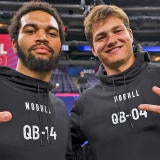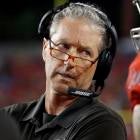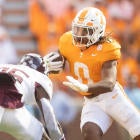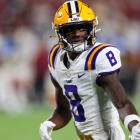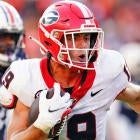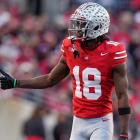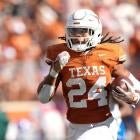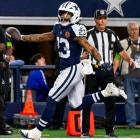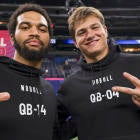The Bengals, Browns, Buccaneers, Cardinals, Jets and Packers all hired head coaches who will call plays for their teams. Their tendencies have already been checked out and early Fantasy determinations have been made:
- Buckle up for Kliff Kingsbury's offense in Arizona
- Freddie Kitchens should keep things cooking in Cleveland
- What to expect from Matt LaFleur calling plays for the Packers
- Adam Gase's arrival should help Sam Darnold take off with the Jets
- Zac Taylor will bring promise to Bengals passing game
- Bruce Arians, Byron Leftwich should put Bucs in a pass-first mentality
The Broncos, Cowboys, Dolphins, Falcons, Jaguars, Lions, Ravens, Titans and Vikings all have new playcallers getting ready to roll in 2019. It's time to figure out their strengths and weaknesses.
I dug into each of the new offensive coordinators around the NFL to get some initial ideas on how they'll operate. And, since this is all about Fantasy Football, I ranked them based on how much they'll improve their players' performances in 2019.
1. Dirk Koetter, Falcons
- Has coached offense in some capacity every year since 1983
- Been in the NFL since 2007, including with the Falcons 2012-2014
- Known for aggressive style with lots of downfield plays
- Matt Ryan had career year with him in 2012 (4,719-32-14); has since bested those numbers
- Julio Jones averaged a touchdown every two games with Koetter; had only 10-score season in 2012
- Running backs have tallied at least 21 percent of all receptions under Koetter in nine of the past 11 years, including 24 percent or more in all three seasons in Atlanta.
- Tight ends have caught 20 percent or more of Koetter's team's passes in eight of the last 11 years, including each of the past three seasons in Tampa Bay.
What it means: The Falcons have typically been slow adapting to coordinator changes but this one's different since Koetter has been with the team before. His track record suggests a sizable role for Devonta Freeman and perhaps Ito Smith, and Austin Hooper has already been highlighted by head coach Dan Quinn as a candidate to progress further. It will be most interesting to see how Koetter utilizes Calvin Ridley following his rookie breakout season, especially on deep passes. Ridley only had 92 targets -- that number should rise under Koetter.
2. Kellen Moore, Cowboys
- All-time winningest quarterback in college football (50-3)
- Former NFL backup quarterback
- Has exactly one year of NFL coaching experience (Cowboys QB coach in 2018)
- Replaces Scott Linehan as playcaller; spent five of six seasons as a backup in Linehan's offense
- Reputation for being smart about creating variations to existing plays & dissecting defenses
- Just 31 years old
What it means: The Cowboys aren't overhauling their offense.They're just putting their own version of Sean McVay in it. Moore is considered a football genius, one who has helped Dak Prescott evolve since he backed him up. Legend has it that Moore, the son of a high school coach, collected playbooks as a kid! Moore was a stud at Boise State by being a slick anticipatory thrower while working out of a slew of formations and shifts to trick defenses. In other words, he ran a wildly creative offense, something the Cowboys have sorely lacked. Without changing playbooks, bank on the Cowboys becoming more clever -- and thus more productive -- under Moore.
Adding talent in Jason Witten and Randall Cobb might send Prescott's numbers to all-time highs, making him a serious late-round breakout candidate. Prescott already did well with Amari Cooper late last season.
3. John DeFilippo, Jaguars
- Son of a football coach, former quarterback
- Runs a version of the West Coast offense
- Previously worked with Nick Foles in Philadelphia
- Known for being very pass-heavy; was fired last year for it
- Has coaxed big seasons out of slot receivers (Adam Thielen, Nelson Agholor)
- Was the offensive coordinator for Gary Barnidge's lone big season (79-1,043-9)
What it means: The Jaguars know how to run the ball. They need help creating a good pass game. Hiring the guy who got fired for throwing it too much actually makes sense. DeFilippo's playbook should be a piece of cake for Foles to get down, accelerating the progress this offense takes to jell in August. Only in Cleveland did running backs and tight ends pick up over 20 percent of his receiving play calls, so there is a little worry about Leonard Fournette being ignored in passing situations. Keep an eye on Dede Westbrook on Draft Day -- he was Duval's leading receiver in 2018 and is best suited for the slot in 2019.
4. Darrell Bevell, Lions
- Former collegiate quarterback
- Vikings playcaller 2006-10, Seahawks playcaller 2011-17
- Has reputation for being a run-heavy playcaller
- Worked with some greats including Brett Favre, Russell Wilson, Adrian Peterson and Marshawn Lynch
- Ranked 15th or better in total yards in each of his past four years (twice in top 10)
- Ranked 20th or lower in total yards just three times in 12 seasons
- Only twice in Bevell's 12 seasons have receivers accumulated over 59 percent of the team's receptions
- Only five receivers have amassed 100-plus targets under Bevell (none more than 125).
- Running backs have caught at least 20 percent of the passes in 11 of 12 years
What it means: Bevell is known for being running-back focused, but wouldn't you be if you had Peterson and Lynch as your feature backs?! In his past two seasons in Seattle, both without any capable feature rusher, Bevell called pass plays 60 percent of the time. Kerryon Johnson should be the primary guy for the Lions, but this team has been devoted to using multiple backs for years. Johnson's injury history doesn't help. He's a risky Round 3 pick.
Bevell does seem to like spreading the wealth in the passing game, so don't rush to judgment on Kenny Golladay erupting -- he'll have to be a touchdown beast to leap into the top-12 among receivers. Ditto that for Marvin Jones, who really has only two positive Fantasy seasons under his belt. Rookie T.J. Hockenson doesn't feel like a safe bet to emerge in 2019.
5. Chad O'Shea, Dolphins
- Was Patriots wide receivers coach for the past decade
- Instrumental in developing Julian Edelman, helped coach Wes Welker
- First-time playcaller at any level, but has playcalling experience from preseason games
- Helped with red-zone game planning for the Patriots
- Expected to use Erhardt-Perkins offense, but larger focus will be on utilizing players based on opponents' weaknesses (sound familiar?)
- Grew up in Miami, played quarterback in college for Marshall (1991-93) and Houston (1994-95)
- Also has special-teams coaching experience
What it means: Many are cautiously optimistic about O'Shea's Patriot-like approach, but until we see who plays for Miami in 2019, especially at quarterback, it's tough to lay out Fantasy implications. Some conceptual projections would include Kenyan Drake as a passing-downs back, Albert Wilson as a slot receiver (whoever plays slot for Miami should be very productive), Kenny Stills reprising his deep threat role and Mike Gesicki as a mini-Gronk. Drake may also take a share of the early-downs work because no other back on the roster is particularly good.
6. Kevin Stefanski, Vikings
- Former defensive back
- Broke into NFL in 2005 with Eagles, been with Vikings since 2006
- Replaced John DeFilippo late last season in effort to re-establish run game
- Strong knowledge of West Coast offense
- Will be guided by Gary Kubiak, who is the Vikings new assistant head coach/offensive advisor
What it means: Stefanski has stuck with the Vikings despite teams sniffing around him for two offseasons. He's expected to navigate a Vikings offense that, under Mike Zimmer's orders, ran the ball 24.3 times per game in their last three. Unless Zimmer changes his mind, expect Minnesota to remain run-centric, which is great for Dalvin Cook as long as he's healthy. Rookie Alexander Mattison is in great position to be the backup and is a must-draft if you take Cook in Round 2.
However, the run-balanced approach cost Adam Thielen and Stefon Diggs some serious numbers late last December. There isn't much worry about Diggs continuing to improve as the top receiver in Minnesota, but Thielen's numbers seem more dependent on the Vikings run game's success. Only seven times in the last two seasons has Thielen and a Vikings running back both had good weeks in Fantasy.
7. Greg Roman, Ravens
- Been in NFL since 2011, called plays for Buffalo in 2015 and 2016
- His teams have ranked eighth or better in rushing in each of his five full years as an offensive coordinator
- His teams have ranked 28th, 29th or 30th in passing in five of six years -- and 23rd in the outlier
- Mixes a downfield passing game with his run-heavy approach
- Uses exotic formations and emphasizes blocking
What it means: You know the Ravens offense you saw with Lamar Jackson under center last year? Expect to see more of it this year. Roman has thrived with rushing quarterbacks like Colin Kaepernick and Tyrod Taylor, so he should be in his element with Jackson. It should result in some good rushing numbers for Jackson and Mark Ingram, Baltimore's new rusher. It doesn't quite bode well for the Ravens' receiving corps, especially since both Marquise Brown and Miles Boykin are rookies who missed the offseason program with injuries. Jackson's most reliable pass-catcher last year was Mark Andrews -- watch him this preseason.
8. Rich Scangarello, Broncos
- A coaching veteran of 24 years, most with non-Division I colleges
- Offensive coordinator: Carleton (2001), Wagner (2016), NAU (2012-14), Milsaps (2010-11)
- Disciple of Kyle Shanahan, working with him in Atlanta (2005) and the past two years coaching quarterbacks in San Francisco
- Credited with discovering undrafted rookie Nick Mullens
- "Roots" in the zone-run scheme, plans on being aggressive offensively
What it means: After passing on hiring Shanahan to be their head coach in 2017, the Broncos brought in Shanahan's most recent right-hand man to oversee the offense. It should result in a system familiar to Broncos fans and John Elway since Bill Musgrave ran something very similar to it last year, right down to zone-run principles. It meshes well with Phillip Lindsay provided he gets 15-plus touches per week.
The passing game doesn't have a ton of potential. Joe Flacco has one season with 4,000 yards passing and isn't exactly known for creating great Fantasy receivers. Rookie tight end Noah Fant and second-year wideout Courtland Sutton are the kinds of targets Flacco has leaned on for much of his career, but neither one is a lock to produce well for Fantasy. DaeSean Hamilton's catch totals took off after Emmanuel Sanders tore his Achilles, but Sanders started training camp on-time and figures to work into the offense. It will be hard to find a reliable Broncos pass-catcher in 2019, which is why all of them are getting taken past 75th overall.
9. Arthur Smith, Titans
- Former offensive lineman
- First-time playcaller at any level
- Broke into the NFL as a defensive quality control coach in 2007
- Was most recently the tight ends coach
- Has been with the Titans since 2011, surviving three coaching regimes
- Will keep Matt LaFleur's playbook and verbiage so players won't have to learn a new system
- Is experienced in the West Coast offense, says he's a "big fan" of the scheme
- Intends to be balanced on offense but spoke highly of Derrick Henry and leaning on him
What it means: You'd prefer for Smith to have some playcalling experience, not to mention his own playbook. The track record of coaches working out of someone else's playbook isn't good, either. It would be shocking to see Smith get wild in his inaugural playcalling season with someone else's work. Additionally, this make-or-break year for Marcus Mariota could yield minimal results in the passing game. Bank on the Titans sticking with a conservative approach, which will help Henry out plenty, but not so much anyone else.








